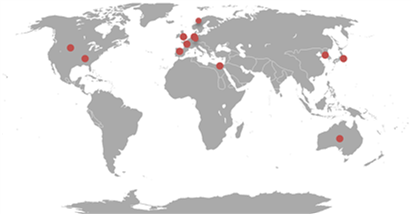- Children and Young Adults
- Chronic Conditions
- Dissemination and Implementation
- Engagement in Care
- HIPxChange
- Mental Health
- Stakeholder Engagement
Lead Investigator
Resources
For more information, please contact Dr. Rachel Grob at rachel.grob@wisc.edu
Toolkit
- Engaging Research Participants in Disseminating Health Experiences Research Toolkit
- Catalyst Films about Health Experiences Guidebook
Other
- All modules are freely available for use on HealthExperiencesUSA.org
Areas of Impact
Overview
To improve depression diagnosis and treatment, researchers at UW-Madison, Johns Hopkins University, Oregon Health & Science University, Yale University, and the Veterans Administration have brought diverse patients’ voices to the challenge of depression among young adults through the launch of HealthExperiencesUSA website, which has had over 50,000 annual visitors. A curriculum based on our web site is educating 760 University of Wisconsin medical students every four years and we are discussing the national expansion of the curriculum with the potential to impact over 85,000 medical students.
The Clinical Problem
Patient experience is an aspect of health and health care that has received increasing attention in the U.S. For patients and caregivers facing a new diagnosis, or needing to make a health-related decision, other people’s experiences of the same diagnosis, treatments, and impact on the life course have always been valued. With the advent of web-based health information, the influence of patient experience has grown even more rapidly.
In the U.S., patient experience to date has been measured largely via quantitative national patient experience surveys. These assessments, though representative and reliable, have never been very engaging for patients, who often do not find them meaningful. Alternatively, online health information sites that do present patient experiences, often provide a few anecdotal accounts that focus on extraordinary or inspiring cases.
Our Response

The launch of HealthExperiencesUSA.org
“It’s a move from anecdote to science. We need to do it with the assurance that we’re not just collecting the outlier story, but rigorously collecting the full diversity of patients’ experiences and representing them responsibly.” — Rachel Grob, PhD, UW-Madison, Department of Family Medicine & Community Health
Recognizing this gap, researchers at six universities—including UW-Madison—and the Veterans Administration formed a collaboration called the Health Experiences Research Network (HERN) to bring an internationally-vetted method of rigorously collecting diverse health experiences to the U.S. HERN currently includes researchers from UW-Madison, Johns Hopkins University, University of New Mexico, University of Utah-Salt Lake City, Yale University, Oregon Health Science University, the Veterans Administration, and patient/consumer representatives from across the U.S.
In 2016, they launched www.HealthExperiencesUSA.org with an inaugural module on diverse young adults’ experiences with depression, a disease that can have significant consequences for future social, occupational, and health outcomes. Since the launch of HERN’s first module, several other modules have been launched on HERN’s website, including Traumatic Brain Injury in Veterans, Cancer Risk that Runs in Families, and most recently Breast Cancer.
HealthExperiencesUSA.org is the United States’ version of the United Kingdom’s Healthtalk.org — an online resource featuring patients’ narratives that present a wide range of patient experiences organized into modules, each based on a particular illness or health condition.
The patient narratives utilize the Database of Individual Patient Experiences (DIPEx) methodology, which was developed in 2001 at Oxford University and has been adopted by researchers in 13 countries to date.
 At the heart of HealthExperiencesUSA.org and Healthtalk.org is a commitment to marrying systematic qualitative research studies about patients’ experiences with health and health care with development of a public-facing web-based resource (or “module”), which features video and audio clips from the studies, and can be used by multiple audiences, such as other patients, researchers, clinicians, and medical students.
At the heart of HealthExperiencesUSA.org and Healthtalk.org is a commitment to marrying systematic qualitative research studies about patients’ experiences with health and health care with development of a public-facing web-based resource (or “module”), which features video and audio clips from the studies, and can be used by multiple audiences, such as other patients, researchers, clinicians, and medical students.
Who uses this type of information?
- Patients and families wanting to learn from the experiences of others
- Clinicians seeking to understand aggregate patient expectations and experience
- Educators wanting to include the patient perspective in teaching
- Researchers who want to improve health care by taking patients’ perspectives into account
- Policy Makers eager to highlight patient experience while avoiding anecdotal accounts
Development of a medical school curriculum
The high costs and complex logistics associated with bringing patients into the medical school classroom and the variable nature of patients seen at different preceptor offices means that medical students are only exposed to a limited selection of patients’ experiences in their clinical training. However, their future practice will include a broad range of patients.
With support from the Macy Foundation, faculty from UW-Madison used the module examining young adults’ experiences of depression to develop and pilot test a 3-hour, online course for 3rd-year medical students in their primary care clinical rotation. The curriculum provides learners with self-directed instruction to guide their 2-3-hour exploration of website topics, and they complete brief written reflections throughout. The UW-Madison School of Medicine and Public Health adopted the medical student curriculum into their Year 3 Chronic and Preventative Care block. Through the end of 2021, the curriculum trained approximately 767 medical students, impacting the training of medical professionals in the state of WI. This work has implications not only for training future clinicians to address depression specifically, but also for increasing their sensitivity to diverse patients’ experiences in a range of other salient areas as future modules are released. The curriculum was shifted to an asynchronous online course and is currently offered to all Year 3 medical students.
Lasting Impact
“I have battled with depression for most of my life, and like the idea of being able to help others who have suffered this illness with my own story.” – HealthExperiencesUSA Participant
Since its launch, HealthExperiencesUSA has had tens of thousands of annual visitors to the site, and new modules, expansion of the medical school curriculum, and new applications are all underway.
New modules on HealthExperiencesUSA.org
Since the launch of HERN’s first module, modules on Traumatic Brain Injury in Veterans (supported by the VA), Cancer Risk that Runs in Families (supported by UW-Madison Wisconsin Partnership Program, ICTR, and WPP), and most recently Breast Cancer (supported by UW-Madison Wisconsin Partnership Program, ICTR, and WPP) have launched on the site. Over the next five years, numerous other modules will be launched on HealthExperiencesUSA.org, including Childhood Cancer, Adolescent and Young Adult Cancer, Gulf War Illness, Gulf War Veterans’ Health Experiences, Clinical Trials, Multiple Sclerosis, Opioid Use Disorder, and experiences with lasting effects of COVID-19.
Adoption of the curriculum
The University of Wisconsin School of Medicine and Public Health adopted the medical student curriculum into their Year 3 Chronic and Preventative Care block. Work is also currently underway to disseminate the curriculum nationally, which has the potential to impact ~85,000 medical students nationwide.
This work has implications not only for training future clinicians to address depression specifically, but also for increasing their sensitivity to diverse patients’ experiences in a range of other salient areas as future modules are released.
Spreading the word
Ebony Magazine and USA Today featured the Depression in Young Adults website in articles about depression in the African American community and in relation to recent high-profile suicides.
Breast Friends Cancer Support Network, a Voice America podcast, featured the Breast Cancer module in a recent episode. Dr. Rachel Grob and Michelle Beck, the host, discussed the module and DIPEx research methodology, as well as various topics from the module including: Diversity, Fairness, and Taking Action; Sex and Sexuality; Advocacy; and experiences people had that are not commonly discussed in breast cancer research, including the experiences of those with LGBTQIA+ identities or those with metastatic disease.
A free toolkit to help other research teams develop patient ambassadors for health experiences research, Engaging Research Participants in Disseminating Health Experiences Research, is available on HIPxChange. The toolkit contains actionable information, lessons learned, and tools and resources to create an ambassador program, plan dissemination activities with ambassadors, and evaluate their role in the dissemination activities.
HERN released its first ever catalyst film on HealthExperiencesUSA, using the Young Adults Experiences with Depression module; the film is now available on the HealthExperiencesUSA and HIPxChange websites. Catalyst films about Health Experiences are short films made up of narratives – interviews of people discussing their health experiences and experiences receiving health care. A primary goal of these films is to get patients, families, consumers, health care professionals, educators, and researchers all talking together about how they can improve experiences of health care. These films are created and designed to ensure there is adequate, meaningful, and active representation of patient voices and experiences in improvements, co-design, or education processes. This project was completed in partnerships with the Center for Patient Partnerships, ICTR, and University of New Mexico.
A free catalyst film toolkit is to help a variety of audiences develop catalyst films about health experiences, Catalyst Films about Health Experiences Guidebook, is now available on HIPxChange. The toolkit contains actionable information for others who are interested in including health experiences in process changes and/or the improvement of healthcare and social services. It can also be used to inform policy change, research, or for educational purposes.
References
- Ziebland S, Grob R, Schlesinger M. Polyphonic perspectives on health and care: Reflections from two decades of the DIPEx project. J Health Serv Res Policy. 2021 Apr;26(2):133-140.
- Grob R, Schlesinger M, Wise M, Pandhi N. Stumbling Into Adulthood: Learning From Depression While Growing Up. Qual Health Res. 2020 Jul;30(9):1392-1408.
- Pandhi N, Gaines M, Deci D, Schlesinger M, Culp C, Karp Z, Legler C, Grob R. Broadening Medical Students’ Exposure to the Range of Illness Experiences: A Pilot Curriculum Focused on Depression Education. Acad Med. 2020 Jan;95(1):72-76.
- Grob R. Qualitative Research on Expanded Prenatal and Newborn Screening: Robust but Marginalized. Hastings Cent Rep. 2019 May;49 Suppl 1(Suppl 1):S72-S81.
- Grob R, Darien G, Meyers D. Why Physicians Should Trust in Patients. JAMA. 2019 Apr 9;321(14):1347-1348.
- Grob R, Schlesinger M, Barre LR, Bardach N, Lagu T, Shaller D, Parker AM, Martino SC, Finucane ML, Cerully JL, Palimaru A. What Words Convey: The Potential for Patient Narratives to Inform Quality Improvement. Milbank Q. 2019 Mar;97(1):176-227.
- Grob R, Roberts S, Timmermans S. Families’ Experiences with Newborn Screening: A Critical Source of Evidence. Hastings Cent Rep. 2018 Jul;48 Suppl 2:S29-S31.

